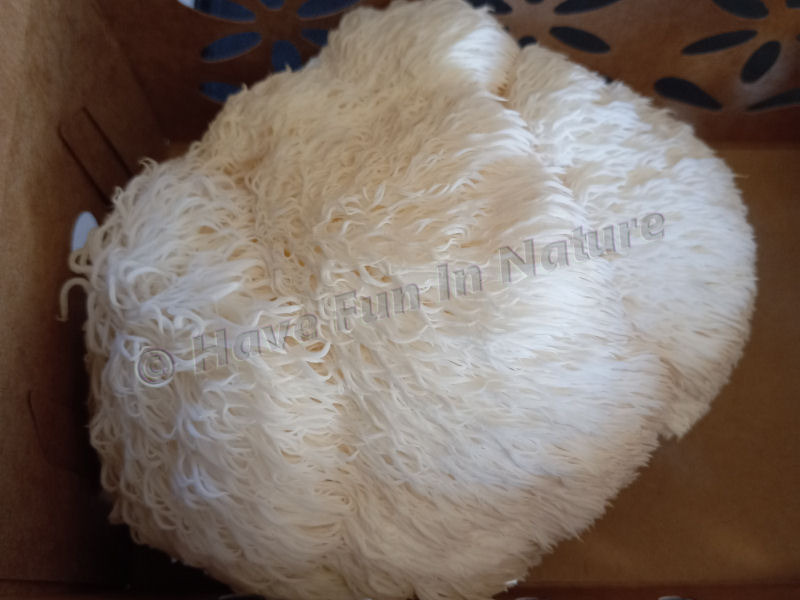Today, more people than ever are looking into the health benefits of mushrooms to heal their mind and body.
Lion’s Mane mushrooms (Hericium erinaceus) are large, white, shaggy, edible mushrooms that belong to the Tooth Fungus group. It’s also known as the Bearded Hedgehog and has a pom-pom like appearance. They have crowded, hanging, spines that produce spores and are over a half inch long. Their fruit bodies can range anywhere from two to fifteen inches in diameter.
Lion’s Mane can be found on dead or injured hardwood trees, like beech, oak, and maple, during the late summer and fall months. To harvest this mushroom, cut off the fruiting body at the base and make sure it’s mostly white. Handle it with care to avoid bruising, place it in a non-plastic bag, and store it in the refrigerator for up to two weeks. These mushrooms can also be purchased at a local farmer’s market or grocery store.
The fruit bodies are used in medicines and in a variety of dishes. They have a mild flavor, meaty texture, and can be sautéed, baked, or stewed. Some people use it as a substitute for lobster and crab. Lion’s Mane can also be used in supplemental forms like extracts, capsules, tinctures, and powders. It has been used for centuries and is very popular in Japan and in traditional Chinese Medicine.

So what are the potential health benefits of this white, shaggy mushroom?
Health Benefits of Lion’s Mane
Lion’s Mane mushrooms have anti-inflammatory properties, anticancer abilities, antimicrobial effects, and antibacterial properties. They contain compounds that stimulate nerve growth, essential vitamins and minerals, and potent antioxidants. The National Library of Medicine has published several research studies on the medicinal values of Lion’s Mane. Some of the health benefits include:
Improves Brain Function and Mood
Studies have shown this mushroom’s power in improving memory and focus, slowing the rate of neurodegeneration (loss of brain cells), and causing brain cells to grow and form new connections. Research has also shown the compounds in the mushroom can increase energy levels and improve mental health including symptoms of depression and anxiety.
Helps Treat Digestive Issues
Lion’s Mane mushrooms have been used to treat peptic ulcers, gastritis, and inflammatory bowel diseases. Studies suggest that Lion’s Mane can inhibit the growth of H. pylori and protect the stomach lining. It also has anti-inflammatory properties which may help treat inflammatory bowel diseases such as Crohn’s disease and Ulcerative Colitis.
May Reduce the Risk of Heart Disease
Animal studies have shown that an extract of Lion’s Mane mushrooms may reduce the risk of heart disease by preventing blood clots, reducing the risk of stroke, and lowering blood pressure. Studies also suggest it may prevent the increase of LDL (bad) cholesterol while increasing the HDL (good) cholesterol in the body.
May Help Fight Cancer or Slow the Spread
The compounds found in Lion’s Mane have been shown to kill cancer cells and slow the spread of cancer in the body in several test-tube and animal studies. One particular study looked into the anticancer potential Lion’s Mane extracts had against human gastrointestinal cancers. Long-term trials are still needed on humans to see if this mushroom can help fight and slow the spread of cancer.
Helps Manage Diabetes
Lion’s Mane has also been shown to lower blood sugar, improve insulin levels, and may help ease diabetic nerve pain in animal studies. It’s also been shown to have a protective effect on the kidneys, pancreas, and liver according to one scientific report. Researchers are testing to see if this mushroom has the same effects in human trials.
Boosts Immune System and Reduces Inflammation
The anti-inflammatory and antibacterial properties found in Lion’s Mane along with the powerful antioxidants and other chemical compounds provide an excellent boost to the immune system, reduces inflammation, and protects the body from oxidative stress.

Lion’s Mane Safety and Dosage
Lion’s Mane should not be used by anyone who is allergic to mushrooms or preparing for surgery. Consult your doctor if you are on anticoagulant, antidiabetic, antidepressant, immunosuppressant, or blood pressure medications. Always be sure to check with your healthcare provider before starting any new herbal remedies.
Dosage depends on a person’s individual body type and needs. Start with the lowest dose possible, pay attention to your body, and increase your dosage as needed to the recommended dose.
Our Personal Experience
As nature lovers, Brian and I are interested in trying foods that can be found in our natural environment. We purchased a Lion’s Mane mushroom at our local farmer’s market last fall, but unfortunately due to our van trip, we didn’t get around to trying it. While we were in Florida last winter, we ran across this mushroom growing in the wild. We took a few images, left it in the tree, and started looking into this mushroom.
After our van trip, we continued our research into the benefits of this mushroom and purchased an herbal Lion’s Mane extract from Herbify. We started with a micro-dose, paid attention to our bodies, and increased our dosage to a full dropper when it felt right. Within the first week, the results were noticeable. We had better focus, memory, and clarity along with more energy and we noticed other health benefits.
Later, we were asked by a friend if the two of us knew an alternative, natural solution to some of the over-the-counter “brain” drugs on the market. So, we told our friend about the benefits of Lion’s Mane, the safety precautions, and where we purchased ours. About a week later, we heard the herbal extract had arrived and was starting to help our friend with mild cognitive decline.
Always listen to your body and consult your healthcare provider when trying new herbs. If you feel it is right for you, please look into this powerful, beneficial mushroom today.

